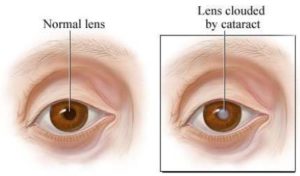by Maxine Lipner EyeWorld Senior Contributing Writer

Illustration showing a normal eye and an eye effected with a cataract
How the procedure may impact mortality risk
New study results indicate that cataract surgery can lead to longer life in women. The study published in JAMA Ophthalmology1 indicates that cataract removal in older women is associated with a 60% lower risk of death, according to Victoria Tseng, MD, PhD, resident in ophthalmology, University of California, Los Angeles.
This study was an outgrowth of an earlier investigation, the Women’s Health Initiative. “The original purpose of that trial was to study the effects of hormone therapy and dietary changes in postmenopausal women to see what kinds of outcomes they had,” Dr. Tseng said. “That study was cut short because they found that hormone therapy could be associated with an increased risk of a vascular event.” Even though the trial was stopped early, investigators continued to collect data until 2015, which meant there was 20 years of continuous information on them.
Mortality risk
In the recent study, investigators included only women who had a diagnosis of cataract. “Our goal was to compare people with cataracts who were not operated on and people who had cataract surgery,” Dr. Tseng said, adding that the study population included approximately 73,000 women who had a diagnosis code for a cataract and who were 65 years or older. “We followed them to see how many of them died over time,” she said. “We looked at all-cause mortality and cause-specific mortality.” Investigators grouped the cause-specific mortality into cardiovascular, cancer-related, neurological, pulmonary, infectious, and accidental causes.
“We found that cataract surgery was associated with a decreased risk of not only all-cause mortality but every other kind of mortality for the people who underwent cataract surgery versus those who had a cataract and didn’t get surgery,” Dr. Tseng said, adding that she was surprised that regardless of what kind of mortality they considered here, there was a protective association to cataract removal. Those who underwent the cataract surgery were a little sicker than those who decided not to undergo the procedure, Dr. Tseng noted. The reason for this, however, was unclear.
Anne Coleman, MD, PhD, Fran and Ray Stark Foundation Professor of Ophthalmology, Stein Eye Institute, and professor of epidemiology, Fielding School of Public Health, UCLA, views the fact that mortality was decreased by cataract removal as making sense. “As an ophthalmologist, I was not surprised because I think that people take their vision for granted, and vision helps with functioning in life,” Dr. Coleman said. “If you can’t see, you can’t take your medication—you can mix up your pills because you can’t tell the difference in colors.”
Even walking can become out of the question because of an increased risk of falling. “That limits the amount of exercise you can do because if you’re having trouble seeing, you’re not going to feel comfortable going outside and walking in the park or taking a hike, so people start curtailing their exercise,” Dr. Coleman said. In addition, if you can’t see, you can’t drive and that leads to isolation, which is bad for older individuals who need the social interaction. “When you take out patients’ cataracts, it’s transformative for them,” she said. “The next day, they can see colors, they can read the paper, they can move around easily, and it changes their lives,” Dr. Coleman said. “As a clinician, I think it’s one of the best surgeries you can do.” Transformative surgery
Unfortunately, most ophthalmologists don’t see those who decline to undergo the procedure. “That’s why these types of studies are important because as clinicians we get biased samples of who comes to us,” Dr. Coleman said. She views the information from this study as important to get the word out to primary care doctors and family members to get patients to have their eyes checked for cataracts. Dr. Coleman recalled a patient from the beginning of her career who had count fingers hand motion vision due to cataract and had stage 4 breast cancer. “The internist said it would be worth it to operate on her because she had another 6–12 months to live and it would be ‘transformative,’ and he was right.” After having her cataracts removed, the patient was able to regain some of her own autonomy, and she could see her children and grandchildren. “It was life changing for her,” Dr. Coleman said. Dr. Tseng said that clinically speaking this puts cataract surgery in a new perspective. “Often when someone is ill or there are a lot of things going on, the eyes tend to get neglected,” Dr. Tseng said. “I think you shouldn’t forget about someone’s visual function even if they’re very ill because based on our results, there may be benefits for these patients even if you don’t think that they’re going to live long.” Overall, Dr. Coleman hopes that practitioners remember how important vision is to the overall quality and length of life for patients. “I think we get so focused on our own field that we forget how important vision is,” Dr. Coleman said. “It’s not just for someone’s quality of life but also the length of their life, and it plays an important role in their health.” Ophthalmologists can use this information in talking with other medical colleagues and help educate them, she concluded.
Reference 1. Tseng VL, et al. Association of cataract surgery with mortality in older women: findings from the Women’s Health Initiative. JAMA Ophthalmol. 2018;136:3–10.
Editors’ note: Dr. Coleman and Dr. Tseng have no financial interests related to their comments.
Contact information
Coleman: coleman@jsei.ucla.edu Tseng: vtseng120@gmail.com
Source: https://www.eyeworld.org/new-benefit-cataract-surgery